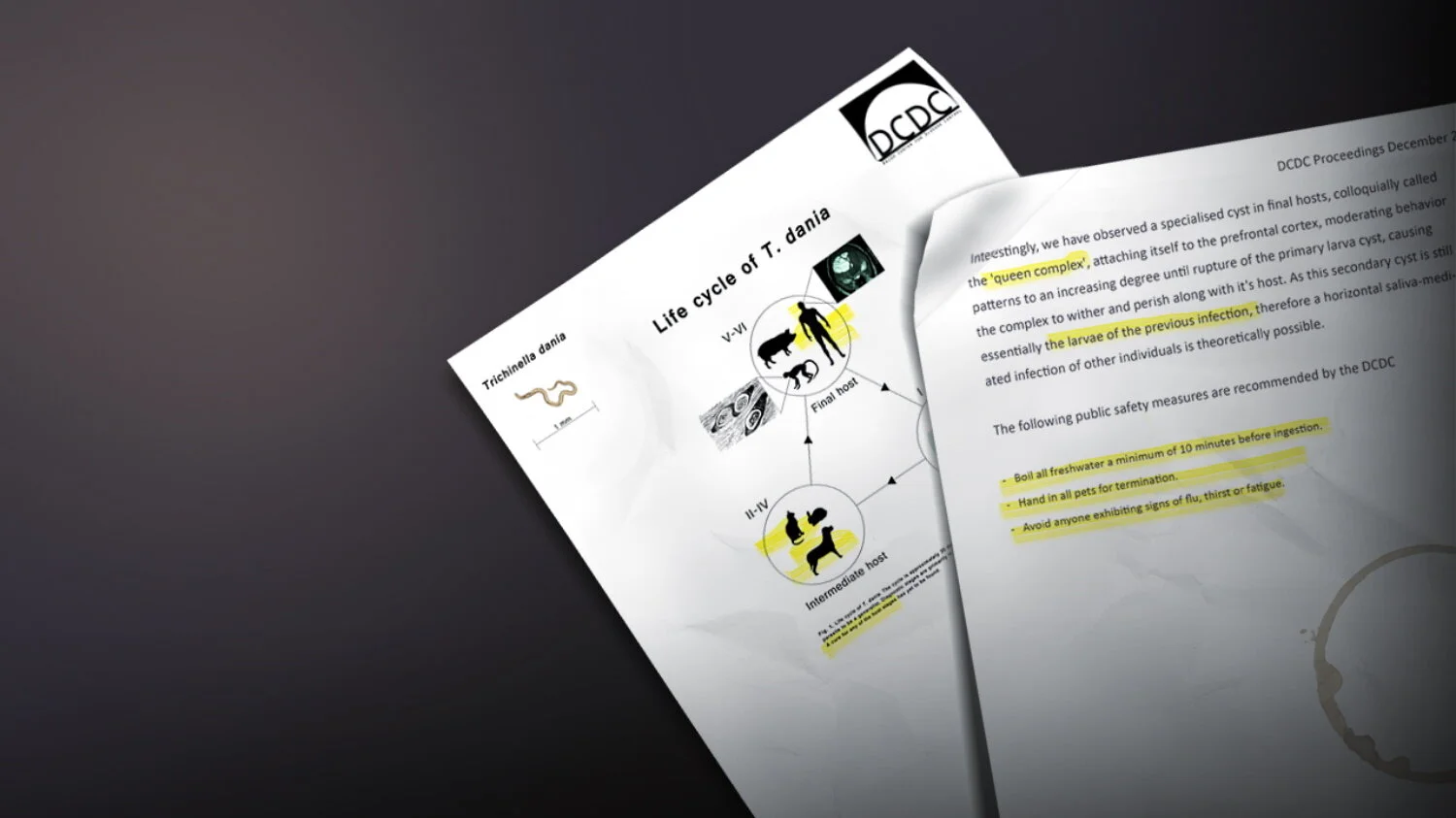Player Experience: Trust me, I’m not infected
From the wolf, sheep and cabbage riddle to a deadly parasite outbreak in Copenhagen,
the core idea behind CPH:EVAC is an experience of distrust. We wanted to create a
setting where players will need each other, but find themselves in a situation where they
cannot trust anyone. We considered many different approaches to achieve this type of
experience, including a more complicated version of the prisoner's dilemma, with 3
parties involved.
What was clear for us from the beginning is that our goal was to create a social activity where the relationships - already existing or enacted- between players will be in the fore ground To do so, we needed to frame our process from the perspective of creating a structure that will guide the activity of play, allowing for different play styles, and enactments of the game depending on the player’s attitude.
We decided that designing a game with differing objectives and hidden information will be the ideal backdrop to inspire mutual distrust and precarious collaboration. We also chose to create an interesting premise to emotionally appeal to the players and to give context to the formal elements of the game.
Trust Issues
The players are presented with an ongoing epidemic scenario of apocalyptic consequences, where a highly contagious parasite is spreading rapidly and changing the behaviour patterns of its hosts. Every players will receive a message at the start of the game, informing them about an evacuation plan, and about what they need to get in order to gain passage aboard the ship. The message will also warn them that, even though they definitely need each other to gather the necessary resources, there might be already an infected among them. This premise is meant to create a suspicious mindset that will be strengthen during gameplay by the dilemmas some of the mechanics pose to the players.
By creating a familiar dramatic context, that of survival in a apocalyptic setting, we wanted to appeal to players heuristics, tapping into the common tropes of this setting, to elicit selfish behaviour and incertitude, as well as a sense of urgency. Furthermore, by constructing our mechanics around group decisions and hidden actions (to promote choices and foster distrust), we expected players to have a lot of discussions during the experience, effectively designing the experience through activity within the game.
The game is designed to abstain from making predisposed moral judgments about the player's choices, aside from informing them when they are group- or self-oriented, as we feel that the strategies that players choose can and should vary as much as possible – even to the point where we fail to see the player logic. An example of this is the “trusty” infected. There is nothing to stop the infected player from helping the group as much as possible, and staying off the boat in the end, effectively making them fight for humanity.
The hospital - a dramatic location in the game
Police Station - During Main Missions players will be able to gain relevant information about upcoming choices
This openness goes with the theme of what we consider to be a Scandinavian survival game – non-violent, democratic and social, with a satirical undertone in relation to Danish institutions and authorities.
We wanted to create an experience that will be appealing to players of traditional card/board games with hidden information like The Resistance, Scotland Yard Master and Battlestar Galactica. Adult players that enjoy social deduction and bluffing games that involve hidden roles and hidden traitor mechanisms, and who would play this game in a group of friends, perhaps at the start of a game night.
Design Process: Asymmetrical Ordeal
Considering that we wanted to design an experience where players will have different roles, we determined that the ideal number of player for our system to support would be5. This number would allow us to design mechanics of deception, where infected players will be able to hide their actions, while also supporting deduction mechanics for healthy players.
We defined the patterns of interactions among players as an hybrid between unilateral competition, multilateral competition and cooperative play. While acknowledging the possible complications, in terms of balancing, of such structure, we considered that it will provide us with interesting design questions to explore in order to create the desired player experience.
During the early stage of concept exploration, we focused on iterating design ideas using sketches. These sketches, simple parameters written on a paper and an online randomizer, were meant as a quick and disposable way of proposing basic mechanics, suggesting challenges and goals for the player, as well as figuring out the game rules.
When deciding what to prototype in order to examine important design questions and evaluating solutions we focused our attention towards the social dynamics. For our game to work we needed to find a way of getting the players talking and discussing with each other. We devised a map with missions on a paper, player cards to keep track of their health status, name tags to identify as their characters and action cards.
One of our main concerns was to design the system in such way that players could progressively learn how to play, instead of getting a long explanation about the rules at the start of the game. For this purpose we integrated the game story into the UI as diegetically as possible. We created ‘The Agency’, an invisible entity that hands over contextual information to the players. With this approach we can provide feedback without taking the players away from the game fiction, and it allow us to take advantage of existing affordances of handheld smart devices (text messages, notifications, emergency alerts, etc.)
“You were told that the situation was under control. This was a lie. Copenhagen is compromised and evacuation is advised.”
“Getting infected negatively impacts your career and life expectancy!”
Winning Scenarios
Get on the ship as a group without any infected
This scenario includes a voting phase where the group votes off the players they suspect that are infected.
Get on the ship all by yourself
This player becomes the sole winner. They've betrayed the group by keeping the cure for themselves and are the only one that are able to gain access to the evacuation ship.
An infected aboard
In this scenario, an infected player has managed to deceived the group and gets on the evacuation ship, infecting everyone on board. Humanity is doomed.
Too late for your group
The group failed to trust each other, they didn’t gather enough resources and missed their chance to board the evacuation ship.


















